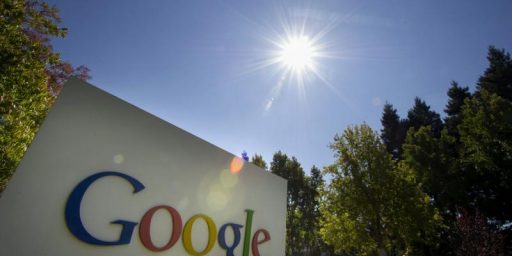Michael Jackson Dies, Kills Internet
Not sure this is BREAKING NEWS, as CNN does, but it’s amusing nonetheless:
How many people does it take to break the Internet? On June 25, we found out it’s just one — if that one is Michael Jackson.
The biggest showbiz story of the year saw the troubled star take a good slice of the Internet with him, as the ripples caused by the news of his death swept around the globe.
“Between approximately 2:40 p.m. PDT and 3:15 p.m. PDT today, some Google News users experienced difficulty accessing search results for queries related to Michael Jackson,” a Google spokesman told CNET, which also reported that Google News users complained that the service was inaccessible for a time. At its peak, Google Trends rated the Jackson story as “volcanic.”
As sites fell, users raced to other sites: TechCrunch reported that TMZ, which broke the story, had several outages; users then switched to Perez Hilton’s blog, which also struggled to deal with the requests it received.
CNN reported a fivefold rise in traffic and visitors in just over an hour, receiving 20 million page views in the hour the story broke.
Twitter crashed as users saw multiple “fail whales” — the illustrations the site uses as error messages — user FoieGrasie posting, “Irony: The protesters in Iran using twitter as com are unable to get online because of all the posts of ‘Michael Jackson RIP.’ Well done.” The site’s status blog said that Twitter had had to temporarily disable its search results, saved searches and trend topics.
Wikipedia saw a flurry of activity, with close to 500 edits made to Jackson’s entry in less than 24 hours. CNET reported that by 3:15pm PDT, Wikipedia seemed to be “temporarily overloaded.”
And so forth and so on. It’s amazing that even robust servers can go down with too many simultaneous queries. One would think that the advent of cloud technologies and redundancies would have ended that by this stage in the Internet’s maturation. Apparently not.






It’s usually not the servers, it’s the connections and bandwidth. The internet protocols only allow so many simultaneous connections per IP address, and even large bandwidth connections can be saturated by a sudden rush of data.
Cloud computing itself is still in it’s infancy, I doubt any of the above mentioned sites use it. Redundant servers don’t help when your internet connection is pegged.
Load balancing is the key, but with traffic like this simple server load balancing isn’t always enough, you run into bottlenecks on the gateway, DNS servers, even switches.
In general, something like cloud computing will leverage the tendency of a spike on one server to be balanced by normal (or even low) activity for other applications/servers. In other words, it smooths out demand by aggregating capacity and demand across many needs. Smoother demand means that the gap between capacity and actual utilization is smaller, which reduces costs.
So, it’s not a magic bullet. A data center will still need to decide whether or not it makes business sense to maintain capacity for a once in N years spike. The difference is that now demand can be aggregated, which results in less spiky demand (overall).
When 9/11 happened, I was in my office in Downtown Rochester. Almost as soon as I’d heard the news, my alarm bells started ringing as the bandwidth consumption at routers I was watching went through the ceiling. The company I was with at the time, had two POPs… one in LA, and one in New York… as it turned out, amost underneath the towers. Both relfetced a huge jump in traffic, despite the early hour on the west coast yet. Numbers from routers on the far side of the firewall in each case were even worse.
I have always marveled that while slow, the net never quit outright, as it did yesterday in a lot of cases. New York particularly shocked me, because as I found out later, the outer wall on the buidling the pop was in, had been damaged by the towers falling.
I imgine there’s a few differneces that might account for this difference; We’re far more ‘on the net’ as a people than we were then… the net wasn’t nearly as universal. Broadband aps weren’t used nearly as much… such as video and audio streams. And since that time, more folks are using the net as their primary source of news.
There was also a sort of shocked response to 9/11, most people just watched the TV news coverage rather than thinking they needed to check out the internet for more info.
Also, during 9/11, the disparity between what the TV news stations knew and what the internet knew favored the TV stations. With MJ, the news broke first on the internet, and they had the scoop for quite a while before the TV stations got the details out.
End-user bandwidth might have also been a factor. Broadband users can hammer more sites than dial-up users, and there are more broadband users now than in 2001.
I would like to emphasis that the internet was fine, both during 9/11 and yesterday. Yesterday a few topical sites were overloaded, but the rest of the internet didn’t notice much.
Well, as I say in the case of 9/11 the numbers were not encouraging, though it held.
Yesterday, boradband simply wasn’t happening at all on eiher of my lines from home, and the cell phone was noticeably slow but serviceable as was the dialup.
I noticed no issues yesterday on my home line or from my server, and haven’t heard of anyone else having issues (apart from topical sites, and now you) with bandwidth.
I think this underscores what a flimsy tool for communication and disseminating information the internet actually is. I don’t believe that the servers are going to be able to keep up now that the internet has kicked into high gear as an ADD Nation’s 24 hour news and entertainment feed.
I remember when we used to be able to avoid insipid celebrity opinions.
A total Worldwide Web crash-a complete internet blackout-would cause far more chaos, disruption, and anxiety than the current economic crisis because it would not allow for denial: the usual ego-preservation strategies would fail in the face of its immediacy.
I predict this, too, will crash under its own weight.
Hilton Runn/Foie Grasie
Not that marvelous; after all, the whole point of the internet was to build a network where large parts of it could be destroyed in a nuclear war and the surviving bits would still be able to function.
We interrupt this week’s edition of Tech Talk to observe what a sad state of affairs we have when a psycho, drug laced, pedophile can hold humans spellbound with his OD just because he made catchy songs with a good beat that are easy to dance to.
Hoo!
Right, because nobody noticed when Elvis or Kurt Cobain died.
It’s understandable how some people would think all the fuss over this is just too much…even Chief Justice Pissypants didn’t care for him all that much…
Your sympathetic interest in pedophiles, and pathetic drug addicts is duly noted, Michael.
WTF?